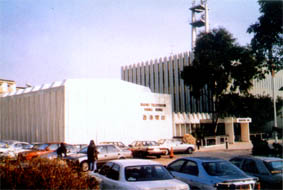
Radio hong kong
Broadcasting in Hong Kong originated in June 1928 and it has been 74 years since.
At 9 a.m. on June 30, 1928, Hong Kong ’s first radio station officially began broadcasting at 3.55 wavelengths and 845 thousand weeks. The station number was GOW and the recording studio was on the second floor of the old General Post Office on Pedder Street, Hong Kong Island. This is the predecessor of Radio Hong Kong, and its opening marked the birth of Hong Kong's broadcasting industry. An important news broadcast that day was "Emperor George V presided over the opening ceremony of the broadcasting system connecting 25 countries in Europe and the United States, Japan, Australia and India today. He made a speech with a golden microphone." At that time, a two-hour program was produced.
The earliest broadcasting in Hong Kong can be traced back to a few years ago. Between 1923 and 1926, some amateur radio enthusiasts formed the "Hong Kong Radio Broadcasting Corporation" and set up a radio station on the top of the mountain to test and broadcast some social news and broadcast opera. Two days a week, two or three hours a day. The members of the agency also conducted a large-scale program of experimental concerts. The listeners at that time were mainly members of the club and some members of the upper class. However, this can only be regarded as a hobbyist ’s activity. It is not an official broadcaster. Until September 28, 1929, the government established the Hong Kong Broadcasting Commission to manage Hong Kong ’s radio stations.
At the time of the broadcast of GOW, only the English channel was broadcast. The target of the broadcast was mainly Westerners in Hong Kong and local upper-class people. The daily broadcast time is short and the impact is limited. The broadcast content is mainly broadcasted by the British BBC radio station, mainly entertainment programs. At that time, the equipment of the station was also very simple. Except for the launching station and the transmitter, all the broadcasting equipment had only one microphone and one phonograph. Except for a few paid employees, other amateurs are keen on radio. A small group of citizens is responsible for management. At that time, radio users had to pay a license fee of 4 yuan to the government each year. By the end of 1928, half a year after the broadcast began, the government issued 124 licenses. At that time, the inspection of unlicensed radio holders was mainly carried out by the police. All funds for this station are borne by the government, so commercial advertisements cannot be broadcast. This provision has been implemented so far.
On February 1, 1929, the GOW station number was changed to ZBW. The site was moved from the top of the hill to the old General Post Office Building in Des Voeux Road Central, Hong Kong Island, and a slightly standard broadcasting room was built in the building. On the evening of October 8, the newly-built broadcasting studio was officially opened. At that time, Deputy Governor Xiao Dun attended and delivered a speech. He mentioned that the radio station was run by the government because no commercial organization was willing to take over. In the same year, the Broadcasting Committee was established, and the then postmaster, Smith, was appointed as the first director (chairman) in the history of Hong Kong broadcasting. Radio licenses have increased nearly four times, and a total of 476 licenses were issued that year. According to the minutes of the first meeting of the Broadcasting Committee, during the first eight months of 1929, an average of 32 radio licenses were added every month. The meeting minutes also recorded that the government's subsidy to the station in 1929 was 1,200 yuan, and it was proposed to increase to 2,400 yuan in 1930. During this period, the daily broadcast time is from 9 pm to 11 pm. At the end of 1929, the station launched news reports and weather report programs. It also hired Ms. Zhong Xiabin as the first program director at a monthly salary of 150 yuan, and invited an opera and dance band to perform on the Zhou Wei program with a 70 yuan salary.
In the early 1930s, due to social development, Hong Kong people ’s radios increased rapidly, and the influence of broadcasting gradually expanded. ZBW Radio launched a Cantonese program in Chinese. The broadcast time gradually increased to 7 hours a day. The content of the program includes the broadcast of British BBC radio programs, regular broadcast of news, weather reports, stock market quotes and British and American stock prices, broadcast of popular music and classical music records, etc.
In 1934, ZBW Radio began reporting news in English. In the same year, a Chinese station was established with the station number ZEK, which was an important milestone in the development of the station. In April 1935, the station used shortwaves to broadcast overseas for the first time, when it was reported that a famous clipper arrived in Hong Kong. In January 1938, a second transmitter was set up, which changed the situation of interleaved broadcasts of Chinese and English programs. On January 1, 1939, the station began to be taken over by the Post Office, and a broadcasting advisory committee was set up to assist management. During the 1930s, the station had great development in the scale, personnel, broadcast time, program content, and number of listeners. During this period, the station had repeatedly tried to arrange exchange of broadcast programs with Guangzhou Radio, but eventually failed to achieve it due to wars and other reasons.
In December 1941, the Pacific War spread to Hong Kong during the Second World War, and Hong Kong fell. From December 8th, the broadcast was temporarily interrupted. Three days later, the Japanese Occupation Army used the original ZBW radio equipment to launch the "Xiangdao Broadcast Week" to begin broadcasting. So far, Hong Kong's broadcasting industry has entered a low tide of three years and eight months.
On August 15, 1945, Japan announced its unconditional surrender. Radio Hong Kong is once again taken over by the Post Office and repairs and supplements the radio equipment. On September 15, 1945, the broadcasting of Chinese and English stations was resumed. In the early post-war period, radio stations were short of staff, funds, and equipment, and broadcast time was short. Once, the broadcast was almost stopped because the stylus of the record player was used up. Fortunately, it arrived by air from India in time. ZBW radio often organizes performances and broadcasts on the radio. The public responded enthusiastically. Therefore, a group of famous artists and famous announcers have been created, and the public has paid more attention to radio broadcasting. During this period, Radio Hong Kong gave full play to the sound function of broadcasting, and produced and broadcast a series of radio dramas adapted from famous stage dramas, such as "Thunderstorm", "Sunrise" and "Wild Field", etc. On the day of the broadcast, The publication of radio dialogues in newspapers has attracted many readers and listeners. In 1949, the English channel of the station added a radio program for British troops stationed in Hong Kong. After several years of hard work, the station's influence among Hong Kong citizens has grown, and Hong Kong's broadcasting industry has entered a new period of development.
In August 1948, the station cancelled the call signs of ZBK and ZEK, officially named "Hong Kong Radio" (RHK). Due to business expansion, the old site of the original Gloucester Hotel in Central was not enough for the application, and Hong Kong Radio was relocated to the Telecommunications of Dadong Telegraph Bureau. The building, and the headquarters as the headquarters, for 20 years.
During the 1950s, in addition to providing information, entertainment, and educational programs to the public, the Hong Kong broadcasting community also frequently carried out charitable disaster relief fund-raising activities through various means, such as regularly holding charity jubilee concerts. This kind of activity has a great influence, and each time it raised a lot of donations, it was later inherited and developed, and became a major feature of Hong Kong's radio and television.
During this period, Hong Kong Radio ’s technology and equipment have also been continuously improved. As of June 1960, Radio Hong Kong set up two 4 kW ultra-short wave FM transmitter stations on Gefu Mountain, Hong Kong Island, and started ultra-short wave FM mono broadcasting to expand the broadcasting range and cooperate with medium wave broadcasting services. In 1968, in order to adapt to the needs of broadcasting development, Radio Television Hong Kong relocated the medium wave transmitting station to Jinshan in the New Territories, and the power of the two medium wave transmitting stations was also increased to 20 kW to improve the medium wave broadcasting effect of Chinese and English stations. Expand its coverage to the entire Hong Kong area.
In March 1968, Radio Television Hong Kong moved from the Central District of Hong Kong Island to the new building of Kowloon Broadcasting Road as a new headquarters, which has been in use to this day.

Follow WeChat

Download Audiophile APP

Follow the audiophile class
related suggestion